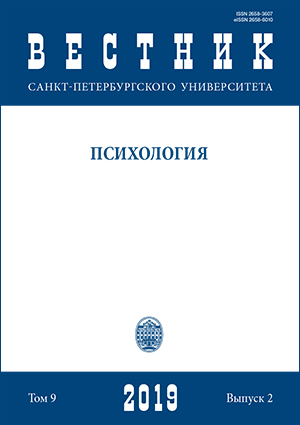The role of self-esteem in response to self-threat
DOI:
https://doi.org/10.21638/spbu16.2019.203Abstract
This article aimed at analytic examination of how people with different self-esteem types re- act to receiving threatening information about the self. We modified K.Mruk’s “Self-esteem meaning matrix” model, which gave an understanding of self-esteem created by the interac- tion of self-worthiness and self-efficacy. According to this modified model, there are five types of self-esteem: positive, medium, negativistic, self-centered and overachieving. Self-threat was modelling by false negative feedback from participants of communication. The study included 231 students (middle age — 20.5 years): 157 respondents in the experimental group (64 male, 92 women), 74 respondents (13 male, 61 women) in the control group. Results of research find specifics of personal reaction depending on self-esteem type: there were differences in cognitive, emotional and evaluative reactions in response to receiving negative feedback. The protective reactions used by respondents in response to the threat of their self-worth are revealed. The most vulnerable to negative feedback were those with positive self-esteem: they show the strongest negative emotional reaction and involve a greater number of protective reactions, including denial, depreciation, discrediting the source of feedback, focusing on their positive characteristics. However, these compensatory reactions do not work in full, and their self-esteem is reduced. Respondents with negativistic self-esteem react differently at the emotional and cognitive levels: they do not want negative feedback, but believe it. Their reactions indicate the “fragility” of this type of self-esteem. Individuals with medium and protective types of self-esteem were more resistant to negative feedback. The response to the situation of self-threat by respondents with different types of self-esteem is explained on the basis of the resource model and self-certification model.
Keywords:
self-esteem, self-worth, self-efficacy, positive self-esteem, medium self-esteem, negativistic self-esteem, self-centered self-esteem, overachieving self-esteem, self-threat, negative feedback
Downloads
References
References
negative consequences of high self-esteem. Journal of Personality and Social Psychology, 1993, vol. 64 (1), pp. 141–156.
Downloads
Published
How to Cite
Issue
Section
License
Articles of "Vestnik of Saint Petersburg University. Psychology" are open access distributed under the terms of the License Agreement with Saint Petersburg State University, which permits to the authors unrestricted distribution and self-archiving free of charge.




